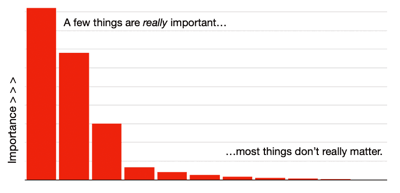One thing I, as a teacher, loved to do was complain about how much work I had.
One thing I never did as a teacher: ask “what am I doing that I don’t need to actually do?”
I never took time to filter out the unimportant and double down on the very important.
Most Things Don’t Matter Much
The Pareto Principle tells us that most things don’t matter – but a small number of things matter a whole lot.

Examples of Pareto
Consider your own education. I’d bet that just a handful of teachers made a huge difference. And the majority of teachers were just, sorta, okay.
You probably can’t even name some of your teachers.
Likewise, I have hundreds of articles here at Byrdseed. Only eight of those articles really matter in terms of readership. They represent 70% of Byrdseed’s total page views.
Those 8 pages are read more than hundreds of other articles combined.

Pareto In The Classroom
This pattern holds true in the classroom. Only a few things I did in a year really mattered.
I spent SO much time spinning my wheels, worrying about things that were quickly lost to the sands of time.
If we know that something is only a 2 out of 10 on the importance scale, we can budget our time and energy better.
As busy teachers, we should figure out what is an 8 out of 10 or higher. Double down on those few things you’re already doing that really matter. Scale back on the most time-consuming things that offer the least benefit.
Ok.
So… what really matters?
A Simple Way To Find What Matters
One way to determine what’s important is to ask the people that experienced it.
Yes, actually talk to your students!
But not your current class. Wait at least a year. Time will act as a filter. Summer break will ruthlessly prune their memory down to the important few things.
Then, after that year, ask some former students one question:
“What do you remember most about our class?”
Easy, right? That’s all you need to ask! Let them
And you don’t need to ask everyone. You don’t even need to ask that many people. We’re not conducting scientific research. We’re just getting a feel.
We’re looking for big patterns, and believe me, you’ll spot those patterns quickly by speaking to a small number of students.
Many of the things that students remember won’t be what you think (or wish!) they’d remember.
An Example Of What 36 Students Forgot
All of the students in my class participated in a massive social studies project in a previous grade. It was a huge deal. Tons of prep for the teachers.
One year, I referenced that project with my 6th grade students.
My class looked at me blankly. “Uh. I don’t think we learned about that in 5th grade, Mr. Byrd,” one student bravely ventured.
They didn’t remember the project!
The massive, time-consuming project that the 5th grade teachers talked about like it was the most important event of all time.
A year or so later, their students doubted that it had even happened!
This experience shook me.
So when you listen to your former students, pay attention to what they don’t bring up. Does no one bring up a giant project that cost you a bunch of money and time and stress? That’s worth noting! Perhaps that thing is something you can simplify.
An Example Of What A Student Remembered
One student I keep in touch with always brings up two things from our year together:
- I let them eat their sandwich during class.
- I did not force them to take notes.
Notice how easy those two things were for me, the teacher. They cost me absolutely nothing. No prep. No time. If I made a list of “Things I Did That Were Most Impactful,” I’d never think to put those things down. They were so easy!
Yet, that’s what my student remembers… a decade later. (Oh, and they went on to double major at an Ivy League school and now make way more money than me.)
I’ve thought about this exchange a lot.
This was a growing pre-teen who played soccer two years above their age. They needed to eat! This student was obviously a genius. Why make them take notes if they don’t need to take notes? (Here’s my article about note-taking, by the way).
These two things were really about common sense and respect. They were not some elaborate project that I spent two months and hundreds of dollars planning.
I wrote more about speaking to past students here.
So, Figure Out What Matters
I hope this simple, free exercise helps you to discover the small number of things that really matter to your students. Hopefully, it also uncovers the expensive and complicated things that no one really remembers.
